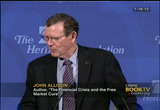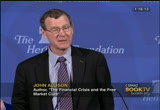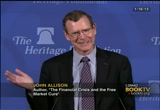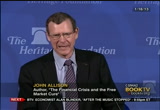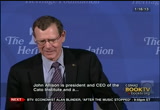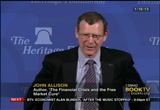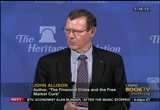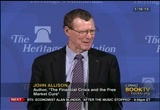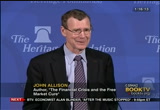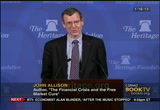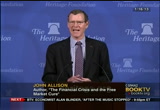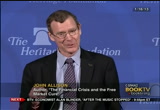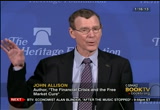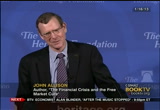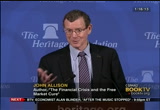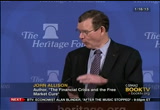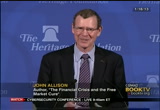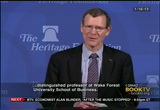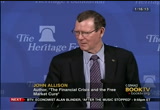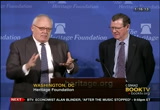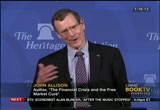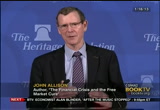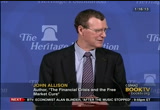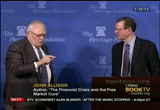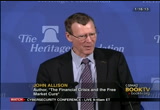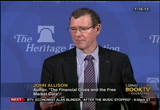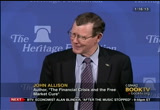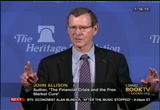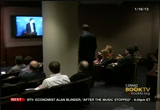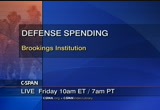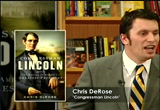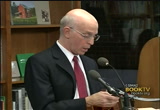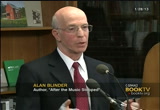tv Book TV CSPAN February 21, 2013 9:00pm-10:00pm EST
9:00 pm
luxury of having some of the least expensive food in the world. despite joe's report of inflation at 3% or 4% that's more of a normal rate of inflation. we saw this country enjoyed the fact that less than 10% of our paychecks are spent on food. either most other developed nations for developing nations come ill pay 15, 20, 25, 40, 50% of your paycheck. so not only do ranchers and producers create this enormous diversity in this great security we enjoyed, but also comes at an affordable price. but there is a risk if we don't have comprehensive immigration reform. it is a man-made risk that can be resolved.
9:01 pm
>> now, the president at the cato institute, john allison talks about his book "the financial crisis and the free market cure." mr. allison served as the chairman of the financial firm dbt. this is 50 minutes. >> inks. it's a pleasure to be here. i want to start by congratulating tremendous success heritage is patently believe it is important for those of us that believe in free markets and free society be working together and i hope that will be the pattern going forward. my purpose today is talk my book, "the financial crisis and the free market cure." i wrote the book before a big deal is coming to cato. people ask me, why did i write the book?
9:02 pm
basic answer is i thought it might be interesting to have somebody annuities talking about read a book about the financial crisis because you listen to commentators and academics that don't do what they're talking about and it's discouraging. in addition, it is important to undo the mess. the state has been great at creating that cities become destructive over the long-term. the myth they have created is that it was caused by deregulation of banking industry agreed on wall street. the simple fact is the banking industry was not deregulated under the bush administration. read the patriot act, the privacy act of sarbanes-oxley. we were missed regulated, not deregulated. secondly, while the money greed, i've been working for 40 years. it is not a sudden plague of greed out of the north it does nothing they are, nothing different. that's not what caused the financial crisis bearden in my
9:03 pm
book i talk about sixteens. first, primary costs was government policy. mixture varies by industry. the least regulated industries technology, which by the way has done very well. the most regulated financial service. after we had our biggest problem. secondly, government policy created a massive disinvestment pickup focus in the residential real estate market. that bubble burst is all due to strain showing for dollars allows. thirdly, large financial institutions called wall street made some serious mistakes. if i'd been charged and what about the institutions fail. however, those mistakes are secondary in the context of government policy. for lan must import me, almost everything we've done, even
9:04 pm
things that might be helpful little bit in the short-term are radically reduce their standard of living in the long-term. this point, even though there's lots of economic cause, the real cause in the real curious philosophical and i will focus on that in my presentation. finally if we don't change direction economically, united states bases in really serious long-term problems. we are doing really bad things her children and grandchildren. what happened? we built too much residential real estate. we invested at least $3 trillion may be as much as they trillion dollars in residential real estate. without too many houses, houses in the wrong place. we should've invested in technology come in manufacturing, education. we should have spent less and save more. we should've borrowed this from
9:05 pm
foreigners. the important thing that a lot of people don't get, housing is consumption because people individually think they invested in a house, they think it's an investment. you can see my house i cannot love you. he overinvested housing, what you're doing is over consuming. so we had the massive overconsumption. it's analogous to eating your seed corn and in that process without millions of people how to do the wrong thing, how to build houses, the mortgage bankers, residential attorneys. as millions of people try to learn how to do something new productive in the global economy, which is one reason it's so difficult to deal with unemployment. if you drive a construction wages commute traffic manufacturing wages, which we
9:06 pm
did with this instruction become a matter of millions of manufacturing jobs overseas to places like india and china. initially the people did know how to do that work for a while. for having a really difficult time getting those jobs that. how did we make a mistake of that magnitude? that is a really big error. they never make a mistake of that magnitude. he takes government policy to create that mistaken in this case it through the culprits are the federal reserves, fdic in government housing policy. in a fundamental context, the real cause our errors made by the federal reserve cut a something many people know but don't get what it means. in 1813 the federal reserve is created, the monetary system is nationalized. there is no private monetary system. if you're having problems in the
9:07 pm
monetary system, with this financial crisis is about, by definition their government policy problems. if the interstate highway bridges are falling down, you see the bridges are falling down and that's the government problem. that is true with monetary bridges falling down. that's what the federal reserve does. the federal reserve was created in theory to reduce volatility. in practice what they do in the short-term is increase problems in the long term. in a free market, markets are constantly corrected. old businesses are failing. the fan process is actually as important as the creation process because its human capital, physical capital can't be redirected to more productive uses. when you stop the downside correction process, all you do is create much bigger problems in the future. it would be analogous to not
9:08 pm
disciplining a 13-year-old and then being surprised that they had behavior at 16. it keeps corrections from happening. in addition, the only way the u.s. government can manage the deficit is because the federal reserve's ability to print on it. today the federal reserve couldn't print money. i don't think the u.s. -- he would not be creditworthy if you couldn't print money and that creates a huge temptation for politicians. i'm not the label discipline physical policy until he do with monetary policy. you have very specific areas to lead to the financial crisis. in the late 1990s, alan greenspan is head of the federal reserve, wanted to be a hero in us getting ready to retire and we had a minor correction.
9:09 pm
so greenspan wants to go on a good note city starts lowering interest rates, the effective printing money and he creates negative real interest rates. you can borrow turn on to criticize in the appreciation rate on housing, which invented a huge investment in housing and then right at the end of his term, greenspan realizes he's screwed up and he and his successors start raising interest rates rapidly and create something called an inverted yield curve. an unnatural phenomenon. only the fed can do it. short-term rates higher than long-term rates. if you invest in the long-term, is riskier, less liquid. only the federal reserve can do that.
9:10 pm
by that honors his make money. that their whole business. if you create an inverted yield curves can't think negative margin. not every business model. the banking business is quirkiness higher interest rates be taking a risk. they went exponential in the longest in u.s. history and at the same time he was claiming there is not going to be a recession. they created a huge incentive to take in order to risk and claim good times that go on forever. in a certain fundamentals and, what kind of math that they had a bubble. this is one question the status never answered. where did it come from if it didn't provide? the fdic insured bank deposits.
9:11 pm
sounds like a good thing. pbt operated in atlanta and competed with a number of community banks. we took over a community bank after it failed and that was sick a lot had failed. 12 guys have been in the hotel business motel business, got together, put in a little bit of capital and labor should radically by buying certificate from average consumers of very high interest rate if the government guarantee deposit from the consumer didn't care about the rest. the bank to have many pylos 50 cents on the dollar. most of the large financial institutions for. washington mutual, golden west, all financed high risk loan portfolios using government
9:12 pm
deposit insurance. the snow with america but of finance countrywide in its high risk business high risk business without guaranteeing the deposit insurance. it is a major disorder of allocation of capital. government housing policy goes back a long time with the government has tried to raise homeownership above the rate. here's the interesting fact. owning a home does not change human behavior. it's exactly the opposite. the discipline allows you to own a home that results in better behavior unobvious encouraging people to buy homes they can afford doesn't end well svc. a government subsidy started with the tax credit deductions people get from housing and in the early 70s they started on a new path it takes a community
9:13 pm
reinvestment act, which forced banks to get into the low income high-risk subprime lending business and banks have no business being in the business. the banks should not be in the high risk when they business. the real big event happened in the summer night 299 were bill clinton made a really mandatory, although it come back a few years. he said freddie mac and fannie mae has to have at least half your loans in affordable housing i.e. subprime lending. that was a dramatic announcement because of the size of freddie and fannie. a number of economists identify the risk involved in this issue and said listen, danny and freddie are so big that there's no way they can meet this goal without radically reducing lending standards in the home mortgage business.
9:14 pm
so it is not that big. if they achieve that goal, they're taking so much risk that studying for any candidate in financial trouble and they are so big they can take a couple u.s. financial system. nine years later it has been. what freddie and fannie failed, the outside trying dollars and they had $2 trillion in subprime mortgages. even before they failed, they would average 1000 to one. it would be like you having a net worth of $10,000. the only way you can do that is if the government guarantees your debt and this is something way under estimated. when he had the dominant player with over half the market share driving down lending standards, it everybody into that whole. people go out of business or get in and this is a government
9:15 pm
driven entity for the whole industry under the congressional dictate. politics played a huge role. i was personally on the committee of the financial services roundtable, the largest banks in the u.s. and i was on the committee for seven years and we're trying to do some in about freddie mac and fannie mae. it is not radically certain they were going broke. anybody in this room, even a 15-year-old would've said these guys are going broke. we met with congress, wonderful people that chris dodd and barney frank. the guy was smart and yet he wouldn't look at the facts. why did he invade? he had a religious belief in affordable housing and they were huge political contributors. at one point they were dissing his biggest contributors to the democratic party. the congress evaded and freddie
9:16 pm
and fannie the whole housing market down the tubes. lots of bells and whistles among the fundamentally we had a massive disinvestment because they permit too much money, ended up in the housing market and there's lots of other things like negative amortization mortgages, the derivatives market, which i really do cover in my book and would be glad to talk about in the q&a. i wanted to focus on something more important. i want to focus on what i really believe caused the financial crisis because of the continuing problem. the financial crisis was primarily caused by philosophical ideas. is a combination of all treason and pragmatism and alters them is not benevolent spirit benevolence is a good thing. all treason is other then. it basically says everybody is more important than you.
9:17 pm
as interpreted in a state is collective is important in the individual doesn't matter. everybody has the right to renée's house. provided by who? everybody has a right to free medical care, provided by who? a right to free medical care is my right to enslave a dock dirt to provide me with that medical care or enslave somebody else to pay for that doctor. that is exactly the opposite. the american concept of race has the rights to reproduce, what you create. you don't have the right to somebody else produces, with somebody else creates. the interesting thing about business likes to do a lot of lip service about altruism. in a globally competitive environment, if your altar is coming out of business very soon. so there's a backup philosophy and is this is what we teach in
9:18 pm
our graduate business schools in the basic room pragmatism is to do what works. here's the dilemma. lots of things work in the short-term that are incredibly destructive in the long term. negative amortization mortgages work for years and were economic disasters. here's some of the biggest problem. you can be rational because rationality demands a long-term growth. you can act on principle because pragmatism has no principles. it's not surprising that so many violations of business because people don't knock and you can't be principles if you don't believe you should have principles. he ought to per. you get something i called the free lunch mentality and we're really that right now in the debate we have going on in our country. with massive deficits and everybody knows it and nobody really wants to do anything
9:19 pm
about it and not free lunch mentality leads to a lack of personal responsibility and the lack of personal responsibility is ultimately the death of democracies. in fact, i'd say by far the central issue in our society today is personal responsibility. are you responsible for yourself or are you entitled to by somebody else produces? that is the fundamental issue in our society. the founding fathers talked about the tyranny of the majority. they were worried about the use of individual rights. but they also realized what it is one of% of the people realized they could go for 49%, pretty soon the party is over. and finally the 30% clip. just like the cause of philosophical, so is secure. the cure's expressway thomas jefferson and the declaration of
9:20 pm
independence. life, liberty and the pursuit of happiness. each individual's moral right to their own life. each individual's moral right to the product of their labor if you produce a laugh, you get about. including whatever terms you want to. if you think about that wall prerogative, it's demands personal responsibility because there is no free lunch. it demands and rewards rationality. it demands that we were self-discipline. life, liberty and the pursuit of happiness. its talk about liberty for just a minute. you know, a lot of defenders of liberty think of liberty is a nice thing to have. it is a nice thing to have, but it's a lot more than that. liberty makes human progress
9:21 pm
possible. there's only one near retro resource and that is the human mind. 10,000 years ago, oil was useless to human beings. oil is useless today to a dear. 15 years ago, telecommunications made out of copper is expensive and rare. they go through made out of silicon. there's only one true natural resource and that is the human mind. the interesting things about human, in order to be productive , you have to be out of thing for yourself and pursue what you believe is true. if somebody forces you to act as if two plus two is five, you cannot think productively. many government rules and regulations, and i know this running a business, force you to act as if two plus two is five. no wonder you can't be productive.
9:22 pm
in addition, all human progress by definition is based on creativity. unless somebody does something better, creativity is only possible to an independent thinker. somebody at conseco crowd cannot contribute to human progress. freedom is essential not because it's nice, but because man's nature is the thinking, independent dean. if you look at human life expectancy whenever human beings evolved, 250,000 b.c. to about 1750, late 1700s from a human life expectancy advanced almost none. since the late 1700s until today, there's been a radical improvement across this whole planet. there was an invention in the late 1700s that allowed that to happen in the invention was
9:23 pm
the concept of the rule of law, individual rights of capitalism. as a human invention that radically improved quality of life and life expectancy on this planet. it is a big deal and it did that because being free is essential for human productivity given its nature as a thinking being. everybody existed for somebody else's good. jefferson seven interesting thing. or not guarantee success in that pursuit, but we have the right. there was a world changing idea, created the most successful and benevolent society in history. there naturally nicer to other people. at the end of the day, everybody hates each other because they are all slaves to each other.
9:24 pm
each of us has a moral right to the pursuit of personal happiness. here's an interesting thing about that idea. it is a very selfish idea. you are pursuing your own personal happiness, but is selfish and the proper context that sometimes we forget. i would call in the context of pursuing one's rational self-interest properly understood. it's not about taking advantage of other people. pretty soon nobody's going to trust you. if you go around manipulating other people camille do a lot more damage to you and you can do a lot of psychological damage to yourself. it's not selfish. but it's also not about self-sacrifice. a question i teach to sudan's and i asked them to ask themselves. if your children, ask your children this question. do you have as much right to
9:25 pm
your life is anybody else has to their life? t. have as much right to your life as anybody else has to their life? of course you do. by which you believe anything different than that? pursuing one's rational self-interest in the context of one's happiness is not about taking advantage of other people and is not. there is a moral code that underlies free society and free markets. i called the trader principle. life is about trading value for value. getting better together. in our business status make a profit doing it and we got better together. life is figuring out how to trade value for value and get better together. only two stable relationship conditions. whenever you get greedy and set up lose when, producing a dense that being a lose-lose. whenever you get self sacrificial and set up a lose
9:26 pm
when, you'll get better and you end up in a lose this relationship. any relationship in your life that matters you should ask what's in it for them because at the end of the day if there's nothing in it for them, there will be nothing in it for you. of course it's in their self-interest to invest in your community because you got to love the context. but what i enjoy doing helping create that world. so acting in self-interest is not taken advantage of other people, but about having a purposeful meaningful life for you. if we are willing to defend the pursuit of happiness, we cannot defend free-market, we cannot defend capitalism as a fundamental philosophical issue and that was part of the genius of the founding fathers than a lot of what this fight, i believe, is really about because if you can't pursue your own
9:27 pm
happiness, what follows from that? a couple thoughts on economics. a maturing business guy, trained economist and i think economic reductionism possible, but i'll give you one anyway because people always ask about it. i think we are an economic recovery in people conservative didactic or getting ready to have an economic disaster was possible is unlikely. worse still have a very vasiliev the economy. it's going to be slow. it'll be way below what growth rates it should be. will be stuck with higher unemployment number probably going to face stagnation. unfortunately the compound difference between a 1.5% growth rate and a 4% growth rate is huge. so were probably not going to have in the short-term.
9:28 pm
we are setting up an environment for way below par growth, which is very significant long-term consequences. i do get really worried about 10, 20 years down the road. we do have a recipe for economic disaster in that timeframe and if we don't change from all truism of pragmatism prelunch mentality and the principles that made america great, the numbers are staggering. the unfunded liability under social security, medicare, is accessible on hundred trillion dollars is a stunning number. we're running out for one shilling dollars. if we did our accountability businesses do, we're running a negative profit statement for the united states government. with a big problem in the
9:29 pm
retirement is a nontrivial problem family of a failed failed k-12 education system by any rational economic stance. we have the potential for bad times we don't change direction. it is not today because these these things go exponential in about eight years. but we've got that timeframe in order to start moving. if we don't live in the next four or five years, it becomes almost impossible not not clear to fix problems without some kind of social upheaval. it would be fun i don't think. even with the recent election results, i happen to be fairly optimistic and i know that sounds strange. i do think two things. i think the american sense of life as a protector to a degree, that americans have some level don't like big government.
9:30 pm
when times seem to be moving the wrong direction, we often get positive surprises as in 2010 with the americans push back and said we really don't like this direction. the biggest thing we've got going is the best ideas. the good news is that as our candidates failed over and over again. people tell me how surprised they were when the soviet union failed. communism always fails. you don't know what to do. they might do something crazy, but it always fails and stated some fails. ..
9:32 pm
secondly, we had a really high respect for rational decision-making, making logical decisions based on the facts. not evading the facts doing a very thoughtful process. but most importantly, i think we need to get a clear sense of purpose. we need to accomplish this purpose. you must arrange her self-esteem. it is the foundation for happiness. happiness is the beginning. happiness and having a good time on friday night. i call it blood, sweat, and tears great when you are 80 years old, look back and say, that was hard, but i'm glad i did it. properly earn, self-esteem is
9:33 pm
most important. for my the vast majority of people on the planet, single driver is your work for self-esteem. you can discourse yourself time and time again. that is what makes work important. we actually have very spiritual issues. you will never fool you. no matter what. if you view your work the best you possibly can, you will lower your self-esteem if you do not
9:34 pm
be careful. that includes if you are a college student. if you don't do your work the best you can do, you need to make a good grade. if you do your work the best you can do it, you will raise your self-esteem. it is more important than money and college and your character. it is a fundamental part of human nature. the societal implications for that, take a construction worker, a brick layer. my granddad had a job like that. he and his wife are successful. maybe his granddaughter becomes ceo of a publicly traded company.
9:35 pm
he may be better off than he needs to be. take the bricklayer. but he loses something incredibly important. he loses his pride. he loses his self-esteem. it is a interesting discussion. while americans care about security, this is not just about security. opportunity to be great. opportunity to fail and try again. but most importantly, the opportunity to get the bricklayer to live life on its own terms. to pursue his personal happiness, given his belief in
9:36 pm
his value. that is why people came to the united states. to pursue their personal happiness, given their beliefs, and their values as independent people. that is what makes our country so great and makes us so precious. thank you very much. [applause] >> john, that was really terrific. i am always glad to hear you. you have all seen the book, i hope, outside. if you have had a chance to read it already. i encourage you to do so. it is full of great things. let's have a few questions. >> sir?
9:37 pm
>> how can we move things further in the direction that we talked about? >> i wish i had an answer to that. but i think the reason we are talking about philosophy, it is what happens in the united states, and we have philosophically moved in the right direction. public policy follows these ideas. and including personal responsibility, but you can't be entitled to what someone else predicts and creates come and that is an important idea. in the end, long-term, most important thing we have to do is recapture the system. when they took over the university, they took over the elementary education. and we have to get that system back because we are having the ideas that are in washington and
9:38 pm
the way to do that, in my opinion, we can do that with vouchers, tax credits, what that would create is competition in education. since our ideas are better, those ideas would win. the biggest fight is over the education system. and that is interesting to me, minorities and income people. it is not designed to deal effectively except for people in college, and the long-term fight about education, i think we have to combine these ideas and we have to impact opinion leaders across the spectrum by world-class resources. because these ideas have all
9:39 pm
been tried. if we do it right, we may not convince the people on the far left that we are right, but we will convince them about the ideas. so we have to face the philosophy. we have to have a world-class research the refuses the consequences of their policies. >> yes, ma'am? >> thank you so much for your remarks. you say that americans don't fundamentally like the government. let's assume it is. i we keep electing big government?
9:40 pm
>> i still think they want that. they say it's very high percentage of they don't want government. but unfortunately, a lot of people can integrate what that means. they don't want the consequences of not having that. what they want is a free lunch, they don't want to pay taxes, they want all of these benefits that they can without paying taxes. i think that is part of the fundamental issues. that is where the objective arguments are maybe more important. were we show the negative consequences. i particularly think how it is for the children and grandchildren. i don't think many grandmothers want bad things to happen.
9:41 pm
it is so detached from reality, it's hard to take it seriously. but what they are doing is reinforcing the rational belief that people want to hope. so we have to do key people inspired great how you keep people inspired at the same time? it is easier if you say that you are going to suffer the consequences. we have this philosophical part, and it is a harder message. that is our challenge, how to make discipline important.
9:42 pm
>> we have this big governing conservative chip, how do we move on to the system and put this economy back into a tailspin? >> you know, i happened to view the banking business and housing and finance in the united states. we did not have a problem. we went down to the local savings and loan and housing and finance is very small.
9:43 pm
very early '80s, they tried to finance houses at 8% fixed rate, suddenly, they were paying money and that is where we filled in that data. housing capital is reallocating more rationally. we are subsidizing consumption, that is what housing units, it destroys wealth and well-being. subsidizing housing and basically what they are doing is economically irrational.
9:44 pm
if you want to subsidize homeownership, do it with a cash payment. and i am opposed to that, there is a certain integrity and not versus subsidizing all these institutions. where people can't figure out what they are going to earn. a lot of this will go to the people who deserve it. freddie mac and fannie mae invested by doing so. it will easily develop in a years time and includes the well-being of the united states. >> when we were speaking before this book, you mentioned to me the extent of the fed's involvement in the micromanagement. can you give us a couple of
9:45 pm
examples? it is so mind-boggling. >> people do not realize how bad it dodd-frank is. it is a very conscious attitude by status to take this over. if you want to control an economy, control the capital. the way to do it safely is to do it in the bathroom. if you can blame somebody else, it's a great way to do it. [inaudible] they hadn't made any big moves yet.
9:46 pm
the government can also stop allocation. they control capital ratios we had to have kappas much capital. that is exactly what they want, green energy. they can subsidize it by having the social purposes, whatever that means. today is a mechanism where they can control allocations in the united states. they have also set up this, where we are going to have massive consolidation. the regulatory cost structure is
9:47 pm
frustrating. it makes you angry. but you can do it. you have to think about things that are productive and running a business and making the bureaucrats happy. to me, it is basically part of the community every day. the micromanagement is also important. today we have to have incentive programs approved by the federal government. i know that that is hard to believe. because we might take the risk. but they have to be approved. you have micromanagement, and what they are going to do is
9:48 pm
consolidate the industry. they will never say that they don't like it, but they want to consolidate this industry that they can control. this is also was also the worst in my 40 year career. they had this obsession with standardization. and here is the problem with that. it is totally a customized process. you can run the numbers that are helpful, but at the end of the day, a lot of the small businessman should not be making decisions based on the numbers. somehow they are going to get it done, and they can't do that anymore. and this is how all of these things have unintended consequences. you can be accused of some kind of discrimination.
9:49 pm
to what you have to do? you have to get to the standardized process. what does that mean? it has to be a higher standard. so they tied the lending standards for small business and so small businesses actually don't have much access to capital markets. some of the things you can argue, i don't know. if you want to control the economy, control the banking business in the allocations. >> us question? >> okay, here we are. >> back to the issue of people believing that they don't need to rely on the government, i read recently some articles
9:50 pm
about the baby boomers and what they have and have not saved for retirement. it is such a stark contrast with the world war ii generation and those who carry balances on their credit cards, and now between this and the recent financial hit. to me, that is concerning because it creates a severing of the safety net.
9:51 pm
>> they got misled in a way because they thought that they had some savings. okay? of course, now the houses may be worth less than they owe. so i think that that is a real economic challenge. and what is bizarre is right now we are doing everything we can and particularly older ladies, maybe their husbands have died, they worked hard to put money in bank accounts. seventy-five years old, 80s and above, they live on the interest of that. and ben bernanke consciously holding interest rates below the marketplace. they don't really have -- but some of them -- [inaudible]
9:52 pm
the longest duration is probably the biggest in u.s. history. it has ethical consequences. i don't think the federal reserve has the moral right to take money from people who work hard and give it to people who can spend it on things like a bigger house. that is one thing that is wrong. >> john, again, it is a pleasure. [applause]
9:53 pm
[applause] as president of the heritage foundation, i would like to say to you, my colleague and president of the cato institute, thank you so much. thank you, ladies and gentlemen. if you have a copy of john's book and would like to have it signed, he will be doing that right up here right now, and we are adjourned. thank you. [inaudible conversations] >> last week, president obama issued an executive order protecting the u.s. from cyberattacks. we will have a meeting on cybersecurity preparedness tomorrow morning with the pentagon and u.s. homeland security officials. you're on c-span2. on c-span, a conversation on national security and defense spending priorities. former senate armed services committee chairman sam nunn.
9:54 pm
>> so the book begins with the calm at the end of the world. we are talking a lot about the media and at this time, there is talk of the media and one of lincoln's friends is absolutely sure that it is going to happen. but he's trying very hard to get this job. he is not the nominee for senate, he may not ever become president. he got passed over, went back to his hotel room, laid down for an hour and couldn't move. he thought it was the end of his
9:55 pm
career. but as we all know, there was something better in store for mr. lincoln. but he ends up losing washington. he headed back towards illinois. >> congressman lincoln arrived in washington in 1837. author chris derose with his book "congressman lincoln" on booktv is weekend on c-span2. >> the economist alan blinder says the 2008 financial crisis was part of a financial system becoming too complex and too unregulated. he served as the vice chairman of the federal reserve board of governors in the clinton administration. he spoke about his book, "after the music stopped", at the politics and prose bookstore last month. [applause] >> thank you very much. david, it is a pleasure to be
9:56 pm
here at this beautiful bookstore. i live here in new york. there is no agreement as to what the best bookstores in new york. but this is clearly the best one in washington. people are shopping and buying books right now. and hopefully that will happen after as well. david suggested that i start with a sensible place to start. by the way, it sounds like i'm winding up for 45 minutes, and i'm not. why about this book, why i wrote it, i would like to quote an e-mail. it was just a letter from a perfect stranger who sent this on friday morning. this is what it says. dear mr. alan blinder. i am really -- back to the
9:57 pm
person that this is why i wrote the book. i would like to start off by saying thank you. i thank you for being the one who wrote a comprehensible book on the financial crisis and i want to thank you because i have been waiting for a book like this to be released. i am only on page nine. [laughter] i made a snap judgment, you will see that you will like it my page nine. i have a clear picture as to how this fiasco began. my wife is on the train with me and she even began to read on with me. here is really the punchline. i think it's important to the citizenry of the united states read this book and understand that plane without understanding proves futile moving towards bettering our nation.
9:58 pm
the sad truth is very understandable because the whole mess was so complicated that people don't understand. but we have gotten in america is incoherent anger. the anger is easy to understand. people should be angry. and there is some understanding whether the anger is focused, and then you have a better understanding of things for the future. it is meant to be a comprehensive plan. there is a reason why i did a foolish thing for my own book royalties, which is wait until 2013 to publish a book. i have publishers coming to me, they came to me in 2008 and 2009. they would write a book on a financial crisis, and i said no, i have no idea how this will end, and i cannot write a book yet. i would have sold more, i am sure. but the question you do get now, which this gentleman entered the well is why a book now on the financial crisis.
9:59 pm
that is really the reason. to take the point further, implied, my biggest fear is what amounts to a gross misunderstanding of what happened, and in particular with the government did in response, and i am coming back to that. it is liable to work on our society the next time anything like this happens. just imagine if europe had blown up financially, but doesn't look very likely at all right now. what would've been the chances of getting through this, a lot of people in this room know that you can ban any piece of leather
82 Views
IN COLLECTIONS
CSPAN2 Television Archive
Television Archive  Television Archive News Search Service
Television Archive News Search Service 
Uploaded by TV Archive on

 Live Music Archive
Live Music Archive Librivox Free Audio
Librivox Free Audio Metropolitan Museum
Metropolitan Museum Cleveland Museum of Art
Cleveland Museum of Art Internet Arcade
Internet Arcade Console Living Room
Console Living Room Books to Borrow
Books to Borrow Open Library
Open Library TV News
TV News Understanding 9/11
Understanding 9/11






